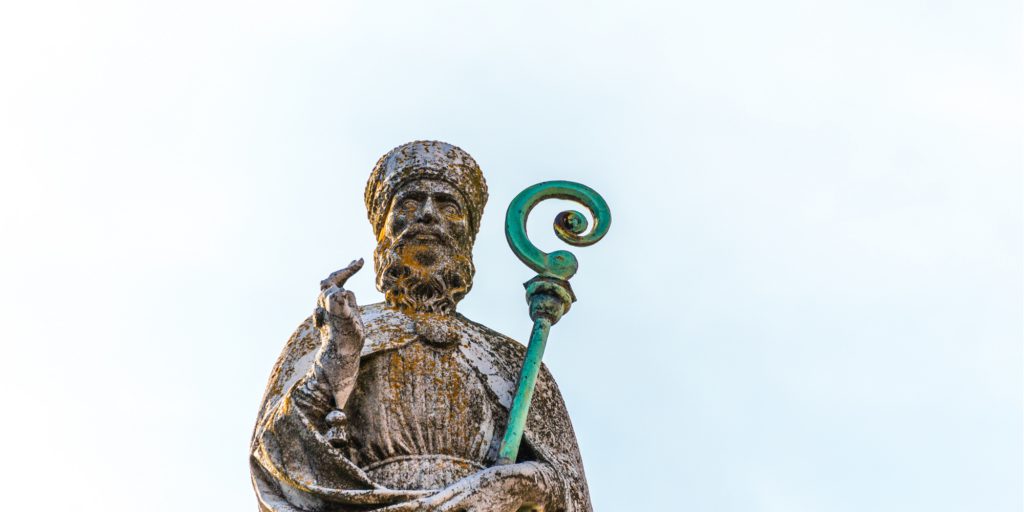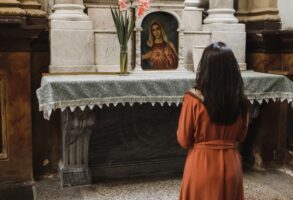
Published April 15, 2021
On September 14, 2018, Bishop Robert Morneau, a retired auxiliary bishop of Green Bay, Wisconsin, issued a short letter in which he admitted that, in 1979, he had failed to report a priest to local authorities for abusing a minor. While Bishop Morneau believed that his actions at the time were in accord with the wishes of the family of the abused, by Morneau’s own account, his failure to report the abuse allowed the offending priest to abuse again.
What made Bishop Morneau’s letter so remarkable was not just his admission of failure almost forty years after the fact, but what he proposed to do in light of that failure:
Because of this, I voluntarily request a withdrawal from all public ministry. I intend to spend my time in prayer for all victims and survivors of sexual abuse and I will do corporal works of mercy in reparation for what I failed to do.
The good shepherd lays down his life for the sheep.
As Catholics, we believe that there is no sin too terrible to be forgiven, but that forgiveness does not erase the material consequences of sin. And, of course, it is also the case that everyone has a right to his own good name. We shouldn’t expect innocent men to act as though they are guilty.
That said, the Church would benefit if more bishops had the courage and humility to follow Morneau’s example, both because there would be fewer instances of scandal, and because prayer and penance are vital to the Church’s mission.
Not every failure needs to end in a withdrawal from ministry to a life of prayer and penance. But the Morneau case stands out precisely because it is so incredibly rare.
I was reminded of Bishop Morneau this week, when it was announced that Pope Francis had requested and received the resignation of Bishop Michael Hoeppner of Crookston, Minnesota. The resignation comes at the end of a two-year Vos Estis investigation into allegations that Bishop Hoeppner, “intentionally interfered with or avoided a canonical or civil investigation of an allegation of sexual abuse of a minor.”
The pope may not let him remain the bishop of Crookston, but Hoeppner seems determined to go out on his own terms. Before he takes his leave, the 71-year-old Hoeppner will mark the end of his tenure as bishop of Crookston with a “Mass of farewell,” which is to be celebrated in the diocesan cathedral. Neither Bishop Hoeppner nor those around him – including many of his fellow bishops – seem aware of what a scandal this is.
Then there’s the case of Bishop Joseph Binzer, an auxiliary in the archdiocese of Cincinnati and former member of the USCCB Committee for the Protection of Children and Young People, who resigned last year after it was revealed that he failed to report a priest accused of abuse to the diocesan priest personnel board. Binzer didn’t even notify his own archbishop. The priest was then reassigned to a parish with a large school, where he abused again. Earlier this week, Bishop Binzer was named pastor of two parishes in Cincinnati.
Perhaps it is unfair to single out Bishops Binzer and Hoeppner. Both men have apologized for their failures. And each case is different; each case is complex. Maybe Bishop Binzer will be a terrific pastor and bring many souls to Christ. God willing. Maybe Bishop Hoeppner can do more good in whatever he has planned next than by going away like Bishop Morneau. I won’t pretend to know.
But given the number of bishops nationwide who have, at best, spotty records on handling abuse, and given the vanishingly small number who choose to withdraw to a life of quiet prayer and penance, it’s hard not to wonder.
Why does it seem that so few of our bishops can imagine a resolution to their own mishandling of clerical sexual abuse that does not involve at least the possibility of their own rehabilitation?
Why do so many disgraced bishops, having betrayed and lost the trust of the flock, continue to inflict themselves upon us, presuming upon our faith and goodwill, while placing their own ministry and careers ahead of the needs of a suffering flock?
Why aren’t more shepherds willing to go away and pay out their lives in prayer and penance in reparation for their sins and failures – and for the good of their flocks?
The Church needs bishops, and our bishops aren’t interchangeable functionaries of Rome to be shuffled around on a whim. But are we really to believe that it is so vital to the mission of the Church and the edification of the People of God that virtually all of these men remain in public ministry? That these men are such irreplaceable ministers of the Gospel that the burden of scandal outweighed by the value of keeping them around? Are the graces won for the Church through a humble life of prayer and reparation so meager in comparison?
These may sound like the questions of one more exasperated layman. But I ask them, not to trash our bishops for being a flawed as the rest of us, or to treat their lives and ministries as so much chaff. Rather, I ask to underscore what is at stake.
Aren’t we all called – each one of us – to die to self? Aren’t we all called to lay down our lives for the Gospel? It would be unfair to expect more from our bishops than what Our Lord asks of all of us, but certainly we should not expect any less.
A good shepherd does not abandon his sheep; he lays down his life for them. And that is precisely why more bishops might do well to follow the example of Bishop Morneau. Bishops who are willing to give up everything – who are not afraid to go and die for their people – are the bishops the Church needs.
Because where a shepherd leads, the flock will follow.
© 2021 The Catholic Thing.
Stephen P. White is executive director of The Catholic Project at The Catholic University of America and a fellow in Catholic Studies at the Ethics and Public Policy Center.











